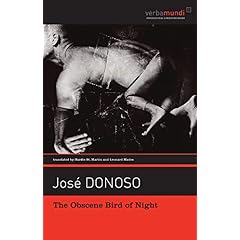

This is one way of summarizing Donoso's novel El Obsceno Pajaro de la Noche (The Obscene Bird of Night) The title is lifted from a letter that Henry James Sr. wrote to his two sons. It is a frightening, beautiful passage:
Every man who has reached even his intellectual teens begins to suspect that life is no farce; that it is not genteel comedy even; that it flowers and fructifies on the contrary out of the profoundest tragic depths of the essential death in which its subject's roots are plunged. The natural inheritance of everyone who is capable of spiritual life is an unsubdued forest where the wolf howls and the obscene bird of night chatters.
Over the course of 30 entries, one for each chapter I intend to attempt to make sense of this rich and layered novel which has often been hailed as Donoso's masterpiece and one of the great works of Spanish literature. Hopefully, contributing a tiny part to help lift this novel from obscurity.
My first encounter with this book was in a graduate Spanish literature seminar I attended during my undergraduate years at Harvard. Regrettably, I have forgotten the name of the professor who led my seminar. The goal of the seminar was to study and discuss a few outstanding works of Spanish literature. Other books included Rulfo's Pedro Paramo, Garcia Marquez's El Otono del Patriarca, Carpentier's Los Pasos Perdidos, and Angel Asturias' El Senor Presidente. I was in this seminar as an academic tourist, as a potential precursor to a degree in Spanish Literature - I was also enrolled in another class by the late Juan Marichal.
In any case, the seminar included not one but two books by Donoso - El Obsceno Pajaro de la Noche and Casa de Campo (House in the Country) The latter book is a deep and entertaining allegory - A group of children at a rural vacation home are left alone by their parents who disappear on an expedition. The parents do not return and so the children organize themselves into a small society around a natural leader - a young and exceedingly articulate boy who also insists on dressing in girl's clothing. The children are left to deal with the local natives - it is hinted they are cannibals - who arrive and invade the country estate. The book, like those of Garcia Marquez, has been discussed as a narrative of Latin American politics. For Donoso, it is as much a story of dictators as it is a collision between the artifice and aesthetics of the European world and the Nativism of the South American landscape.
As regards El Obsceno Pajaro de la Noche, I am basing my readings on two editions. The first is the original Spanish publication by Seix Barral from 1970. The second is the English edition from 1973 which includes this quote from Donoso:
Since this novel first appeared in Spanish, I have made certain cuts and changes which are incorporated into the English-language edition, and which will be used in any future editions of the book.
The English Edition includes as its cover graphic what appears to be an anatomical misfit, a not inaccurate representation of this book of misfits but I prefer the cover graphic of the Spanish edition - a photograph of a burlap sack. I won't unravel the details now except to say that the burlap sack appears only briefly and late in the novel but is one of those details that either clarifies or obscures (depending on your interpretation) the events which precede its appearance. The sack also alludes to "The Man of the Sack" (El Hombre del Saco) who..
"...seems to be one of the earliest versions of the "bogeyman" legend. He manifests in tales as an old man with a large sack slung over his shoulder, stretched taut from the bundles of kidnapped children struggling within. He prowls the backalleys and other dark corners of his haunts, always alert for more unwary youngsters." (EM)
So the two book covers are perhaps similar after all. They both hint that this novel is a novel of misfits and monsters, of dark backalleys, of the inhabitants of the shadow world.
1 comment:
Wow, I found your blog on looking for Charles Hinton, but Donoso is one of my favorite authors and The Obscene Bird of Night one of my favorite books. I look forward to reading your commentary, but had to say hello!
Post a Comment